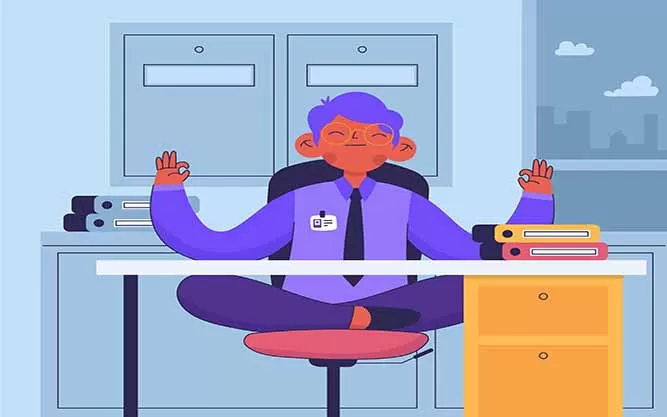Dealing with mental illness in the workplace has been and should be a major concern all over the world. It is because we spend a very significant amount of time in the workplace. We deal with the corporate’s problems as our own.
Sometimes, we emphasize the company’s issues over our own. Therefore, it is the responsibility of every workplace to take care of its employees. Especially when it is a matter of their mental wellbeing.
Mental health issues at the workplace: A global forewarning
1 in every 5 adults in the US has been diagnosed with a mental health disorder according to the National Institute of Mental Health. The number is increasing as the year passes and has shown no signs of declining.
The cost to the global economy in lost productivity due to depression and anxiety is about 1 trillion dollars annually as surveyed by WHO.
This small data is enough to take mental health issues at the office very seriously. Coping with mental disorders are equally important as people do for physical health.

It is not only about morality, addressing mental health problems is important from an economic point of view.
It is because mental-health-related issues in youths and adults, the workforce of the future, are increasing at an alarming rate. Besides this, suicide cases are also high in a frightening manner. This is obviously impacting businesses globally.
One of the major reasons behind this terrifying global impact is the fear of workers themselves. They fear talking about their condition of mental health to their managers or in the offices.
But, why do employees fear talking about their mental health in the workplace?
If you are a mental health patient then you already know why. If you are not, just imagine what happens when you go to your manager and share about the mental challenge you are facing.
The reaction you get could be negative or positive but unfortunately, it’s most probably negative. Maximum managers will ignore the issue. Many will start taking you as a liability to the company.
If the manager or whoever you share your issue with reacts in a comfortable way, you will most probably feel connected with him/her, and get relieved to some level.

Sadly, this isn’t the reality. The leaders/managers at the office respond ‘Now I know the reason how your productivity has been declining” or “I’m not sure you’re a great fit for this team.” Sometimes, they even fire the employee for just wanting the support they need.
This idea of taking the discussion of mental health issues as a taboo creates fear within the workers. This fear is the reason why employees keep their mental health issues to themselves which could lead to performance vulnerability.
What are the impacts of not dealing with mental illness issues at work?
Employees are the heart and mind of any industry or corporate industry. Unhealthy workers are unable to perform at their best which leads to declining productivity in the workplace.
The mental disorders of workers affect the workers themselves personally and the office as a whole.
Employees suffering from mental health issues like anxiety and depression may be trying to manage side effects from the medications they are on. These effects could range from gastrointestinal problems to fatigue and sometimes even suicidal thoughts.
The thought of attempting to be their best while juggling all of this and believing that it is improper to seek assistance can be utterly daunting. When dealing with these challenges, the following consequences may be seen :
Personal impacts
- Lack of commitment to one’s work
- Performance at work drops
- Decreased everyday functioning, and physical capabilities
- Faulty Communication
- Poor judgment and decision-making
Impacts on the workplace
- Reduced team spirit
- Higher workload and decreased group output
Reasons to create a Mentally Healthy Workplace
Having strong mental health is crucial because it enables people to handle difficulties and failures in their life, both at home and in the workplace.

Similarly, team members that are in good mental health are more adaptable when roles and responsibilities change. Taking on challenging problems is totally another topic. Employee performance improves, their capacity for coping with stress grows, and they are more resilient. It ultimately helps each person reach their maximum potential.
In short, the reasons to develop a habit of dealing with mental illness in the workplace are as follows:
- Early detection and prevention are beneficial to both individuals and businesses.
- The overall productivity increases.
- Better Occupational Satisfaction
- The sick days of employees decrease.
- Enhanced physical and mental well-being
Strategies to create a mentally healthy workplace
One of the most crucial actions an employer can perform to enhance an employee’s well-being as well as the health of the entire firm is to assist them in improving their mental health. If workplace mental health initiatives are just developed from an employee perspective, they will fall short; personal-level initiatives must also be implemented.
It is obvious that not all mental health issues may be prevented or reduced by a healthy workplace. Mental illness can be caused by a combination of genetics, traumatic experiences, and life experiences. However, businesses can take measures to support their employees who are dealing with mental illness in the workplace by creating a safe and supportive environment.
Dealing with mental illness in the workplace can be challenging, but by fostering an open and inclusive culture, employers can help employees feel comfortable seeking support. One way to do this is by providing resources, such as an Employee Assistance Program, for employees who are dealing with mental illness in the workplace. Dealing with mental illness in the workplace is not just the responsibility of the individual but also the employer, and it is important to address it proactively to promote the overall well-being of the workplace.
The following steps could be helpful in order to create sound mental health at work:
Personally,
- Exercise regularly
- Eat a well-balanced diet
- Follow a good sleep pattern
- Do the things you enjoy and make them habitual
- Have a sense of self-worth
- Work on being financially stable
- Talk to your close ones and get things that bother you out
At the workplace,
- Hold frequent gatherings
- Set up one-on-one sessions to discuss your workload
- Help clarify and simplify the roles and responsibilities
- Encourage mental wellness by setting an example with your work practices
- Treat mental health with the same consideration as physical health
- Provide flexible working conditions whenever possible
- Establish suitable mental health policies and initiatives
- Try to build excellent management and leadership with high team spirit
- Make employees participate in social pursuits and decision-making
- Access to support at work
- Provide training to the leaders on dealing with these issues in the workplace
A short message to all the managers and leaders
According to Mental Health America, three out of five workers feel that their bosses aren’t providing enough support for their mental health. This highlights the importance of dealing with mental illness in the workplace and the role that managers can play in creating a psychologically safe environment. By interacting with employees on a personal level and demonstrating empathy and understanding, managers can help create a mentally healthy workplace. The key to success is to approach dealing with mental illness in the workplace proactively and with creativity. Employers who prioritize mental health in the workplace will see a more motivated, productive, and engaged workforce.
For more content like this, visit our blogs section.

